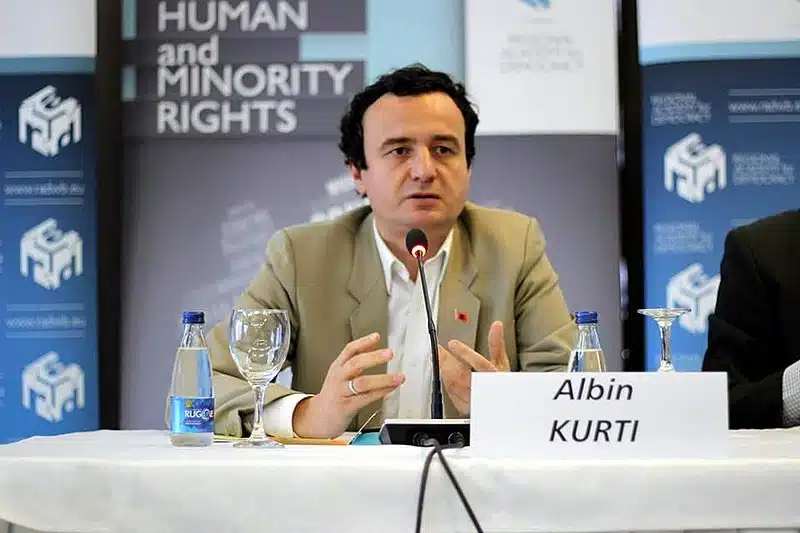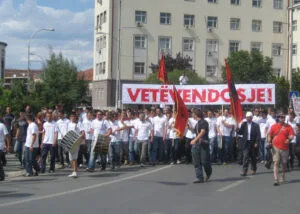Four months after Kosovo held snap elections following the prime-minister’s resignation, its two biggest parties have reached an agreement on the formation of a new government. The deal signed on the 2nd of February stated that the leader of the leftist “Vetevendosje” (VV) party Albin Kurti would become prime minister and work together with the center-right “Democratic League of Kosovo” (LDK) and other smaller groups.
In a joint press conference Kurti and LDK’s leader Isa Mustafa said that “we have already signed the agreement, we have agreed on everything and are sharing responsibilities within the government”. On the 3rd of February the parliament voted on the agreement which saw the majority (66 out of 120) in favor of the new formation.
VV and LDK
The new government will replace the government led by former prime-minister Ramush Haradinaj who resigned last year after he was summoned for questioning by prosecutors at a war crimes court in The Hague regarding his role as commander in the Kosovo Liberation Army (UCK) during the war. In the new elections held in October 2019 Vetevendosje, which means self-determination, won a slight majority over the Democratic League of Kosovo. VV received nearly 26% of the votes and LDK 25%. The PDK, which is the democratic party of Kosovo and the party president Thaçi is affiliated with, received 21%, ending its 12 year reign. The Alliance for the Future of Kosovo led by outgoing prime-minister Haradinaj only received 11% of the votes which is substantially less than the others. These results meant that in order to have a majority, the VV and LDK needed to form a coalition. Even though both parties agree now that there is no other option, this was not always the case. Before the elections took place, the VV and LDK discussed the idea of forming a coalition after the elections but those talks failed. What made it difficult to reach consensus lies in the fact that the LDK is a center-right political party, while the VV identifies as leftist. Even though the party has clear observable nationalist tendencies. The VV’s leader, Kurti, has been part of leftist-nationalist movements since the late 1990s where he advocated for Kosovo, which has an Albanian majority, to break away and join Albania. In 1999 he was arrested for his political views by the Yugoslav government of Slobodan Milosevic and sentenced to 15 years in prison. He was released two years later after Milosevic had gone but his views did not change. Now that Kurti will be the next prime-minister it could have a negative effect on the already strenuous relationship between Kosovo and Serbia.
Kosovo-Serbian relations
The biggest challenge for the new government will be to come to an agreement with Serbia on how the two countries should precede in the future. Kosovo declared independence from Serbia in 2008, nearly a decade after NATO forces drove Serbian forces accused of expelling and killing Albanian civilians in the region. Since then over 100 countries, including the U.S. and most EU countries, have acknowledged Kosovo’s independence but Serbia has not. This has caused tensions between the two countries.
In an attempt to relieve some of the tensions, Kosovo’s president Thaçi and Serbia’s president Vučić started negotiations on a deal that involved exchanging predominantly ethnic Serb territory in Kosovo for predominately ethnic Albanian territory in Serbia. Even though both presidents were in favor of such a deal, both the VV and the LDK were strongly opposed. Talks between the two nations halted in 2018 when Kosovo put a 100% customs tariff on all Serbian products straining the relationship even further.
Kurti recently announced that he is willing to lift the customs tariff if Serbia agrees to recognize Kosovo license plates and identification cards. However, Serbia is unlikely to agree to this proposition. Recognizing Kosovo license plates and ID’s effectively means that Serbia would have to recognize Kosovo as an independent state which it is unlikely to do in the near future.
Nevertheless, the Kosovo-Serbian talks have not come to a complete standstill. In January 2020 a sudden deal was announced in which the flight link between Pristina and Belgrade would be re-opened after twenty years. The deal was brokered by president Trump’s special envoy to the European Union and backed by both president Thaçi and Vučić. President Thaçi has called the deal a great step in the efforts to normalize diplomatic relations between the two countries. Yet, some of the technicalities of the deal seem problematic, such as the recognition of Kosovo ID cards. Regardless, it cannot be denied that this deal creates hope for some real improvements in the relationship between Kosovo and Serbia.
The new government
Even though the deal constitutes progress in the Kosovo-Serbian relationship, it left the VV and the LDK with yet another issue to incorporate in their negotiations for a new government. Eventually the VV and LDK came to an agreement and decided that both parties would appoint 12 (six each) of the 15 ministries while the remaining three posts would be held by representatives from ethnic minorities. Historically, the Serbian community has always held two of those three posts but under the new government they will only hold one. That one position will also not be coming from the Serbian List party even though that party holds all ten of the Serbian seats in parliament because Kurti has consistently refused to have any Serbian List party representative in his government. The Serbian List retaliated by voting against the new government formation. Even though there are improvements in the relationship between Kosovo and Serbia there is still a long way to go. It seems that it is up to the new government to come up with a peaceful solution and create hope for the future.
Sources: Radio Free Europe, Aljazeera, Reuters, DW, AP News 1 / AP News 2, European Western Balkans, Gazeta Express, Exit News, Balkan Insight 1 / Balkan Insight 2 / Balkan Insight 3 / Balkan Insight 4 / Balkan Insight 5, Emerging Europe, World Geostrategic Insight, Bloomberg, Euronews 1 / Euronews 2.
Photo: Wikimedia



